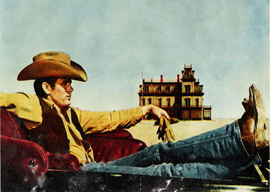
February 01, 2018

James Dean in Giant
Source: Warner Bros
The rest of the army that descended on tiny Marfa, Texas, in the summer of 1955 is extensively profiled and psychoanalyzed in a delightful fast-paced narrative that doesn’t really break any new ground—people have been fascinated with Giant since the day it was announced in 1953—but Don has done us the favor of mining all the secondary sources that no person in his right mind would try to read. (Anyone for Apple Sauce: The Story of My Life? That would be the memoir of Michael Wilding, Elizabeth Taylor’s second husband and perhaps the most boring of the eight.) The only eye-openers for me were the deep background stories about the gay underground in 1950s Hollywood, including the gay casting couches that were probably the source of some of James Dean’s anguish, since he’d been repeatedly molested by a minister while growing up in small-town Indiana and then sought out the agent best known for representing beefcake.
Like many a film historian before him, Don becomes transfixed by the James Dean story, and so the disruptive presence of the little punk who was an acting genius hangs over every page of the narrative. Dean’s antisocial pranks, public acting-out (urinating in front of tourists gathered to watch the filming, to use one example), sulking, snubbing of his peers, and active hostility toward Rock Hudson are all here, but nobody was ever able to get inside his head, either, so we’re never sure what demons resided within this perpetual adolescent. Since the only two things Dean seemed to genuinely care about were acting and fast cars, it’s possible that he was just building up bad karma with Hudson while sucking up to Elizabeth Taylor in an effort to create Method ambience for his scenes in the movie, which, let’s face it, are some of the most iconic and memorable ever filmed.
These were not happy people. Rock Hudson lived in constant fear of being outed as gay by fan magazines. Elizabeth Taylor had shockingly shallow interests (mostly clothes and jewelry), a tendency toward hypochondria, and what used to be called a “fainting disposition.” Dean was probably mentally ill, and Dennis Hopper followed him around like a puppy dog in the same way that Dean had emulated Marlon Brando. The sexual politics—exaggerated by the isolation of the cast and crew in a remote town where there was nothing to do—led to tawdry and all-too-casual assignations in the manner of a traveling circus or a 19th-century minstrel troupe. And yet, in the midst of this Peyton Place, Stevens was steady as a rock, fighting for the Angel Obregon “lonely casket” scene, giving Elizabeth Taylor line readings when there was no other way to nail her performance, dealing with caustic memos from Edna Ferber, yelling at Dean and then coddling him until he released his brilliance, and spending long days in the editing room even as Jack Warner became increasingly pissed off. Stevens had run a unit in the Army Signal Corps in World War II and in the course of that assignment he had met General Eisenhower. He hated him. He thought he was a bad general. He thought Eisenhower should have tried to understand the Germans instead of just killing them, believing it would have shortened the war. George Stevens wanted to understand everything, in detail, and he did.
He even understood Texas. He understood the old-school ranching part, the new-money oil part, and the synthesis of the two that would emerge decades later in the form of distinctive cities like Austin and San Antonio that still make Texas a world of its own. The famous false front of Reata, the Benedict mansion on the prairie, has long since fallen into ruins, and the frenzy surrounding the Giant filming has been all but forgotten, but the land around Marfa is known worldwide today as the domain of Donald Judd and other postmodern sculptors, and Texas remains the only state that has adopted bilingualism so thoroughly that some cities have Spanish media and use Spanish at public meetings. The cattleman’s code, the rebel spirit, and multiculturalism found their center in a region many would consider least likely to succeed, and George Stevens saw that long before anyone else.